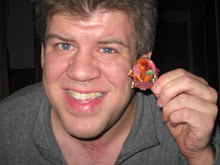Most people would rank Abraham Lincoln at or near the top of the roster of US Presidents. I would rank Steven Spielberg's Lincoln at or near the top of the roster of this year's movies.
And yet, it may not be quite the film people are expecting. It is not a Civil War epic. The ads prominently feature battle scenes, but those scenes are contained within the first five minutes of the film. If you want battles, watch Glory.
Nor is the movie truly a Lincoln biopic, despite its title. It does not follow the journey of the man from humble Illinois lawyer to mythical president. That story has been ably told before, via Abe Lincoln in Illinois and John Ford's Young Mr. Lincoln. The new movie focuses solely on the last few months of the president's life, and, more importantly, his battle to pass the 13th amendment that will abolish slavery.
And yet, Lincoln himself is very much front and center, because that particular battle embodies the man and his legacy. By focusing on this sliver of the man's life, Tony Kushner's screenplay illuminates Lincoln as he has never been before.
This is due in no small part to the masterful portrayal by Daniel Day-Lewis, who is now the definitive cinematic Lincoln. The actor is famous for burying himself in his roles, but he has never done so with greater impact than he has here. Daniel Plainview (There Will Be Blood) did not make me forget Bill the Butcher (Gangs of New York). Bill the Butcher did not make me forget Christy Brown (My Left Foot). But Abraham Lincoln very much made me forget Daniel Plainview, Bill the Butcher and Christy Brown. The actor reveals the president to be a Rubik's Cube of a man, a puzzle that is fascinating no matter what side he displays.
But Day-Lewis is not the only one who disappears into the film. So does Steven Spielberg. Lincoln is unlike any film the director has made before. He delved into this same time period in the underrated Amistad, but that film had visual sweep. Even Schindler's List, which was considered a major departure for Spielberg, had bravura sequences.
Spielberg keeps showy visuals and camera movements to a bare minimum. More than anything else, his new film is a chamber piece. It's essentially two hours-plus of people talking. But that talk crackles with energy and gamesmanship. The film means to make us a witness to history, and it's a riveting master class.
Spielberg is not typically thought of as an actor's director, but he has assembled a brilliant cast with a multitude of well-known names: David Strathairn, Joseph Gordon-Levitt, Jackie Earle Haley and Hal Holbrook, to name just a few. Chief among the supporting players is Tommy Lee Jones as abolitionist Congressman Thadeus Stevens. He passionately believes in outlawing slavery but has to swallow hard when he must compromise his principles and not do it in quite the way he wants. That issue is more than a little timely when partisan gridlock is the order of the day.
The film doesn't conquer all its own problems. I found the material involving Mary Lincoln (Sally Field) a distraction, as was the overextended ending. Spielberg has problems sticking his landings. It's no spoiler to say the film ends with Lincoln's assassination, but showing it is unnecessary. What's more important is what historian Shelby Foote meant when he said that "everything Lincoln did was calculated for effect."
That effect resonates even more thanks to this film.
GRADE: A
Friday, November 16, 2012
Subscribe to:
Post Comments (Atom)

No comments:
Post a Comment